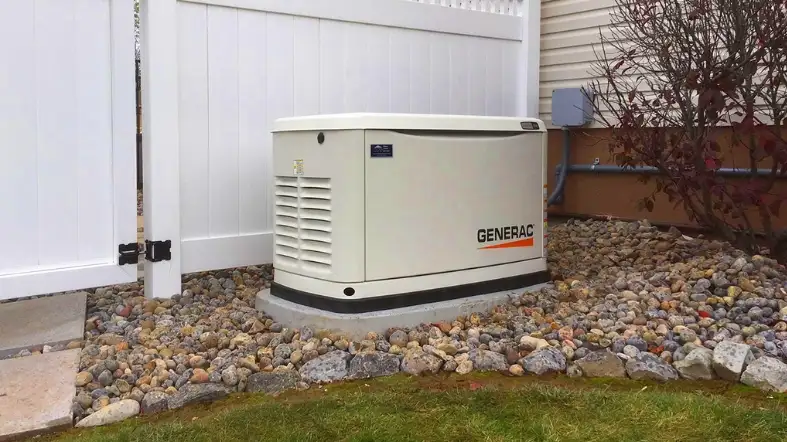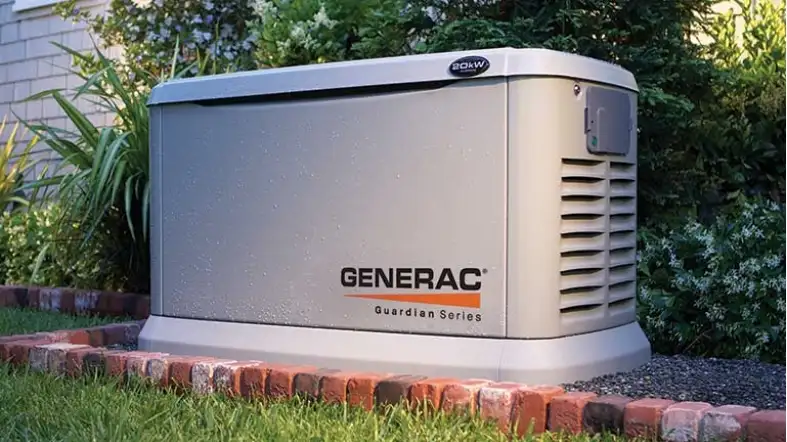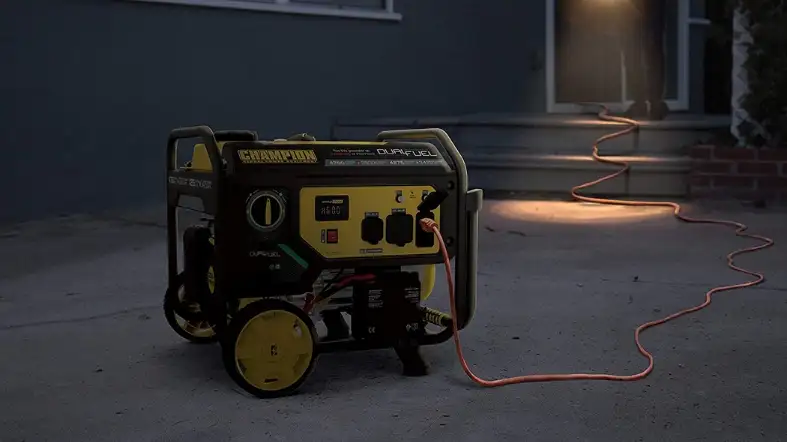Generac generators are a reliable source of power during outages or emergencies. Choosing the right generator size can be a daunting task.
Consider factors such as your power needs, the size of your home or business, and the wattage of your appliances.
In this blog, we’ll provide a comprehensive guide to Generac generator sizes to help you choose the best one for your needs.

Click Here To Check Recommended Generators
Generac generator sizes
When choosing a Generac generator, one of the most important factors to consider is its size, as this will determine how much power it can provide.
Here is a breakdown of the different Generac generator sizes available:
Small Generators
If you’re looking for a generator to power only your essential appliances during a power outage, then a small generator is a good choice.
These generators have a power output of 1,000 to 5,000 watts and can power items like lights, a refrigerator, and a few small electronics.
Medium Generators
A medium-sized Generac generator typically has a power output of 5,000 to 10,000 watts, making it suitable for powering more appliances and devices.
These generators can handle items such as air conditioners, heaters, and larger electronics.
Large Generators
If you want to power your entire house or business during a power outage, then a large Generac generator is the way to go.
These generators typically have a power output of 10,000 to 22,000 watts and can provide electricity for all the appliances and devices in your home or business, including air conditioning units, refrigerators, and even water pumps.
Industrial Generators
For large facilities such as hospitals, data centers, and manufacturing plants, Generac offers industrial generators with power outputs ranging from 22,000 to 2,000,000 watts.
These generators are designed to meet the high power demands of these facilities and are typically used as backup power sources.
Portable Generators
Finally, Generac also offers portable generators for those who enjoy outdoor activities such as camping and tailgating.
These generators are typically small and lightweight, with power outputs ranging from 800 to 17,500 watts.
They can power items such as lights, small electronics, and even RV air conditioners.
Here’s a table summarizing the different Generac generator sizes and their typical power outputs:
| Generator Size | Power Output Range | Typical Uses |
|---|---|---|
| Small | 1,000 – 5,000 watts | Essential appliances such as lights, a refrigerator, and small electronics |
| Medium | 5,000 – 10,000 watts | More appliances and devices, including air conditioners, heaters, and larger electronics |
| Large | 10,000 – 22,000 watts | Whole house or business backup power, including air conditioning units, refrigerators, and water pumps |
| Industrial | 22,000 – 2,000,000 watts | Large facilities such as hospitals, data centers, and manufacturing plants |
| Portable | 800 – 17,500 watts | Outdoor activities such as camping and tailgating, and small power needs for home backup power |
Factors to Consider When Choosing a Generator Size

Here are some factors that can be considered when choosing a generator size,
Power Requirements
When choosing a generator size, determine the power requirements of the appliances and equipment you intend to run.
Calculate the total wattage of all the devices you plan to use simultaneously and ensure the generator can handle at least 20% more than the total wattage to avoid overloading.
Fuel Type
The fuel type of a generator can affect the generator’s size and efficiency.
Diesel generators are fuel-efficient and suitable for high-power applications, while propane generators are ideal for low-power requirements.
Natural gas generators are more environmentally friendly, but they’re less efficient.
Noise Level
Generators can be noisy, especially when operating at maximum capacity.
If you live in a residential area or a noise-sensitive environment, consider the noise level of the generator.
Look for generators that have a low decibel rating or those designed with sound-reducing features.
Portability
If you plan to use your generator in various locations, consider the portability of the generator.
Smaller generators are easier to move around, but they may not provide enough power for your needs.
Larger generators can produce more power but may be challenging to move.
Cost
Generator size can significantly affect the cost of the equipment. Smaller generators are generally less expensive, but they may not provide enough power for your needs.
Larger generators can be costly, but they can provide more power and are more durable.
Maintenance
Generators require regular maintenance to ensure optimal performance and longevity.
Larger generators tend to be more complicated and require more maintenance than smaller generators.
Consider the level of maintenance required and the availability of spare parts and service providers.
Calculating Your Power Needs

When choosing a Generac generator, ensure that the generator you select can provide enough power to meet your needs. Here’s how to calculate your power needs:
Make a list of all the appliances and devices you want to power
Start by making a list of all the appliances and devices you want to power during a power outage.
Include everything you will need, including lights, air conditioning units, refrigerators, and any medical equipment or other devices.
Determine the wattage of each appliance or device
Determine the wattage of each one. You can find this information on a label or plate on the appliance or in the owner’s manual.
If you can’t find this information, you can use an online tool to estimate the wattage.
Add up the total wattage
After you have determined the wattage of each appliance and device, add up the total wattage.
This will give you an idea of the minimum amount of power you will need from your Generac generator.
Consider surge wattage
You will also need to consider surge wattage. Surge wattage is the additional power needed by appliances and devices when they start up.
Some appliances, such as air conditioning units and refrigerators, require a higher surge wattage than their continuous wattage.
Be sure to factor in surge wattage when calculating your power needs.
Choose a Generac generator that can meet your power needs
Choose a Generac generator that can provide enough power to meet your needs.
Choose a generator with a slightly higher power output than you think you will need, rather than one that is underpowered.
This will ensure that you have enough power to run all your appliances and devices, even during peak usage.
The Importance of Generator Wattage

When it comes to purchasing a generator, understanding the importance of wattage is crucial. Here’s why:
Wattage
Wattage is the measure of the amount of power a generator can produce.
Generators with higher wattages can supply more power, while those with lower wattages can produce less power.
Choosing a generator with the right wattage that can meet your power needs is essential.
Different appliances
Not all appliances and devices require the same amount of power.
A refrigerator needs 800 watts to run, while an air conditioning unit may require 3,500 watts or more.
Calculate the required wattage for all the appliances and devices you want to power to ensure you choose a generator with enough wattage.
Surge wattage
Apart from the continuous wattage required to run appliances and devices, surge wattage is also crucial.
Surge wattage is the extra power needed by appliances and devices.
Some appliances like refrigerators and air conditioning units need more surge wattage than their continuous wattage.
Selecting a generator with sufficient surge wattage to handle the initial power requirements of your appliances and devices is crucial.
Overloading
Trying to power appliances and devices that require more wattage than what your generator can supply may overload it.
This can lead to damage or even hazardous situations. Select a generator with enough wattage that can meet your needs and not exceed its capacity.
FAQs
Can I install a Generac generator myself?
It’s not recommended to install a Generac generator yourself.
Generac generators should be installed by a qualified electrician or Generac dealer to ensure that they are installed correctly and safely.
Can I use a small generator to power my air conditioning unit?
It depends on the wattage of your air conditioning unit.
Some air conditioning units require a higher wattage than small generators can provide.
Calculate the wattage needed for your air conditioning unit and choose a generator with a wattage that can meet those needs.
Can I use a portable generator to power my entire house?
A portable generator is not recommended for powering your entire house.
Portable generators power a few appliances and devices at a time and are not equipped to handle the power.
Choose a generator with a wattage that can meet your needs and not exceed its capacity.
Final Words
Investing in a Generac generator can provide peace of mind during power outages.
By choosing the right size generator for your needs and ensuring it’s installed correctly, you can have a reliable backup power source for your home or business.
Don’t let power outages disrupt your life – consider investing in a Generac generator today.

